Just hype with no proven effect? International panel discusses collagen peptides’ growing role in supporting healthy living
Living healthily has become a megatrend in the twenty-first century, shaping consumers’ habits and all areas of everyday life. The demands of an aging society and the desire to live an active life up to old age has amongst others led to a greater awareness and demand for value-added nutritional foods. So collagen peptides have become more and more popular in recent years, as they offer a wide range of benefits that come together under a common denominator:
supporting a healthy lifestyle. But despite scientific studies showing collagen peptides’ positive effect on joint, bone and muscle health, some people still dispute the effect of collagen peptides. Do collagen peptides support a healthy lifestyle or are they just hype with no proven effect? Five international experts explored this question during GROW’s virtual roundtable in June 2022.
Healthy living has become a global mega-trend among consumers, demanding more mobility and a better quality of life, no matter the age
Populations around the world are aging at a faster pace than in the past. This demographic shift has an impact on almost all aspects of society*. Healthy aging and leading an active lifestyle have become not only a growing concern in Japan, the country with the oldest population in the world**, but also in the rest of the world, says Yasuto Fujita, CEO of Integrate Co., Ltd.
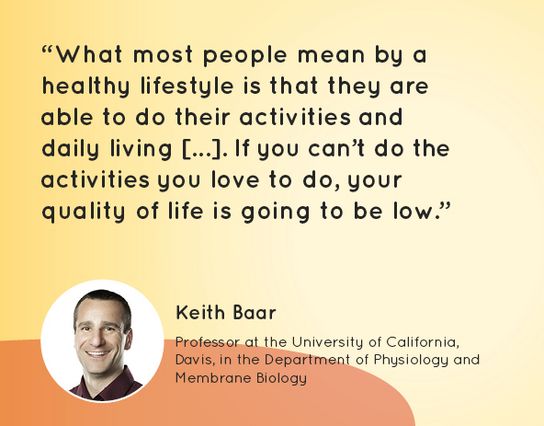
With aging populations, healthy living has become a societal concern. But what does healthy living even mean? According to Keith Baar, Professor at the University of California, Davis, in the Department of Physiology and Membrane Biology, the trend is closely related to the term health span, which is the “period of one’s life that one is healthy”***: He adds: “What most people mean by a healthy lifestyle is that they are able to do their activities and daily living […]. If you can’t do the activities you love to do, your quality of life is going to be low. And so, health span is really the core of this.” So with an aging society the desire for a long health span and, therefore, a high quality of life seems to be increasing.
The coronavirus pandemic has amplified the importance of leading a healthy lifestyle, as it has taken health to the center of the conversation globally, explains Yasuto Fujita. For example, in Japan where the lockdown impacted the population, wellness, he says, became an important topic. “Covid 19 was a big topic in Japan and there was so much concern about immunity and we also had several months of lockdown in which we could not work out, we could not go out, we could not do any sports. So many people had problems with [physical and mental] wellness […]”.
This shift towards a growing consciousness of healthy living amplified by the pandemic can also be seen in global sales of dietary supplements: “A lot of people started taking supplements during the pandemic.” explains Clare Otridge, Account Director at England Marketing. “We know that sales of supplements globally went up by 51% ** during the pandemic, so they are increasing in importance, and it is not a trend that has dipped off again significantly since we have been emerging from that situation [the pandemic]”. But even before the pandemic, health-conscious consumers were attracted to the benefits of dietary supplements.
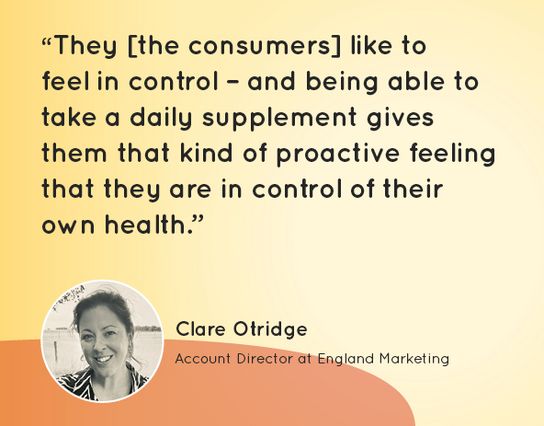
The role of dietary supplements within the megatrend ‘healthy living’ can be seen when looking at the motivation of consumers, as Clare Otridge shows: “What we saw is that mindset is a really important factor. They [the consumers] like to feel in control – and being able to take a daily supplement gives them that kind of proactive feeling that they are in control of their own health”.
Collagen peptides have experienced a growing success on the supplement market due to their numerous functional health benefits
No matter the age, dietary supplements have gained popularity around the world, and so have collagen peptides due to their properties that promote a healthy lifestyle. Keith Baar has done multiple studies and found evidence for multiple positive health effects of collagen peptides. He has observed that the intake of collagen peptides within a healthy diet can help athletes prevent degradation of their cartilage and can therefore impact their performance: “When we give increasing doses of collagen to people, and we have them do an activity […] we end up being able to actually see an increase in markers of collagen synthesis within the blood. […]”. This was the first strong evidence Keith found, showing that there is a dose-dependency of dietary collagen on collagen synthesis within the human body. When studying different aspects of delivery, Keith also found out that Vitamin C is needed as a co-factor, in order to achieve collagen synthesis and thus, performance benefits. All these findings allow Keith to conclude: “Those are the things that have indicated there is a potential benefit to having dietary collagen within a healthy diet and withing training blocks […], and it’s not just for young individuals. It is for people throughout multiple ages and it might become more important as we get older.”
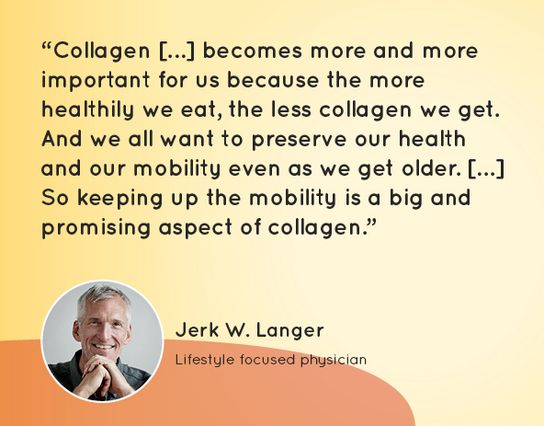
Supplementing with collagen peptides within a healthy diet can also help with different kind of injuries, explains Jerk W. Langer, lifestyle focused physician, who uses collagen peptides to help treat his clients and patients:“I use collagen both as a preventive and pain alleviating measure on my clients […]. I have patients who come with knee pain, patients who have injuries, who have trained too much. What I see is that most people […], if they have pain in their connective tissues […], they have some improvement with collagen and that is what I would expect based on the science […] and often I then see additional benefits.” Some patients do not necessarily experience the wished pain relief; however, they can notice an improvement in another part of the body.
With collagen peptides’ growing success, so called plant-based alternatives appear on the market, misleading consumers
Because of its positive health benefits, collagen peptides enjoy great popularity among health-conscious consumers, causing various plant-based product manufacturers to capitalize on the success by labeling their plant-based alternatives with the word "collagen". But this is misleading to consumers, explains GROW member Nick Deschuyffeleer, Director of Regulatory Affairs Health & Nutrition at Rousselot:
“The wording itself, “plant-based collagen peptides” […] does not exist […] because there is no collagen in plants […]”. While collagen peptides are a natural product, plant-based alternatives, promoted as collagen, are often made up of fillers, binders and chemicals. Nick adds: “[…] that conflicts in fact with what we are doing. We are actually extracting collagen and making collagen peptides. […] so those are two different things. […] we find it misleading for the consumers that they [producers of plant-based alternatives] use the name collagen.” It is therefore important for consumers inclined to choose these plant-products to be aware that they do not bring the same health properties as collagen peptides.
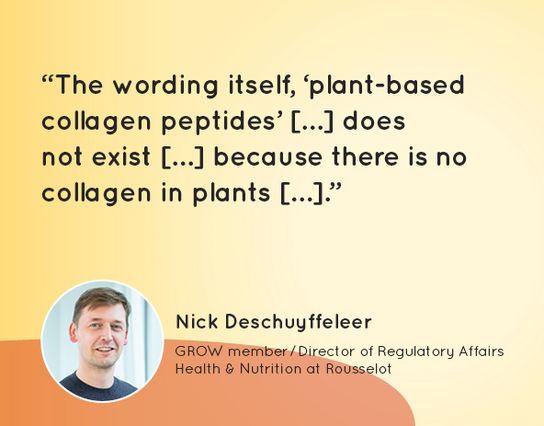
Scientifically proven benefits and effects show that collagen peptides are more than just hype – they are here to stay
After hearing about all the benefits and studies, moderator Stefan Gates takes a look into the future: Are collagen peptides just a trend or are they here to stay? Both Keith and Jerk agree: With vegetarian diets being globally on the rise****, collagen intake gets lower, which means that finding an adequate dietary source of collagen will become more and more important.
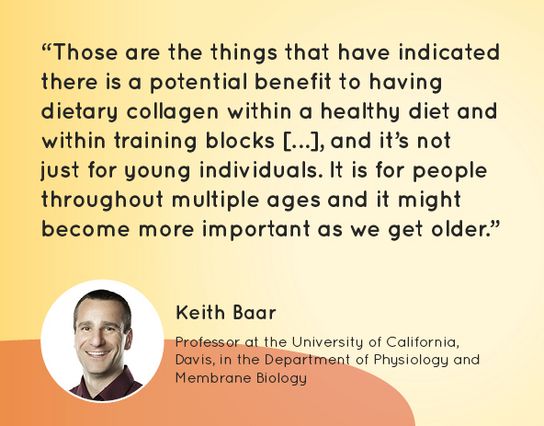
Keith Baar explains: “It’s going to be more and more indispensable as people take on more of a plant-based diet. [….] If the diet isn’t complete – […] then having a dietary source of collagen is going to be really important.”. Jerk W. Langer adds: „Collagen […] becomes more and more important for us because the healthier we eat, the less collagen we get. And we all want to preserve our health and our mobility even as we get older. […] So, keeping up the mobility is a big and promising aspect of collagen.”
Moderator Stefan Gates concludes the roundtable with posing the events’ central question:
Do collagen peptides support a healthy lifestyle or are they just hype with no proven effect? Jerk’s answer is promising: “I think that the science is growing and becomes even more convincing. And there are also some hidden treasures in collagen: we have some indications that it might lower blood pressure, it might prevent leaky guts, help with sore knees, tendinitis and so on. […] So, I believe that collagen is not a myth, it is something very promising and I am looking very positive to the future […].”
*https://www.who.int/initiatives/decade-of-healthy-ageing
**https://www.ilo.org/global/WCM_041965/lang--en/index.htm
***https://publichealth.wustl.edu/heatlhspan-is-more-important-than-lifespan-so-why-dont-more-people-know-about-it/
****https://www.statista.com/statistics/1280079/global-country-ranking-vegetarian-share/

